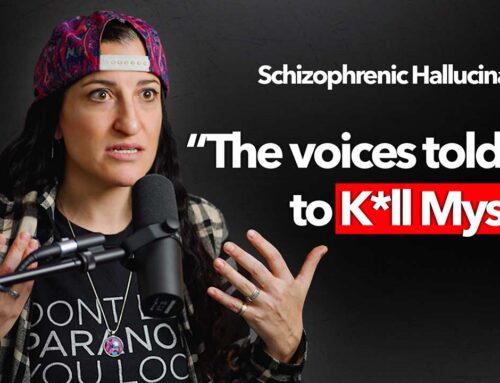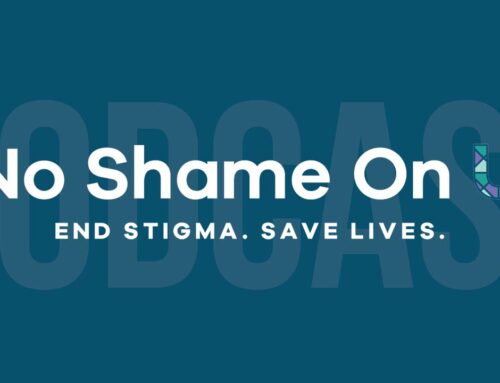Paranoia and Schizophrenia
What does paranoia feel like? How does paranoia affect our day-to-day life? Does social media affect your paranoia? What are some of our coping skills/grounding techniques that help with paranoia? How does misunderstanding of paranoia lead to further discrimination and stigma for people living with psychosis?
In this episode of Schizophrenia and the City, Michelle has a guest, Cecilia McGough, and together they talk about paranoia. First of all, paranoia is different for everyone. For Michelle, paranoia is constantly believing that everyone around her knows exactly what she’s thinking, and that they all hate her vehemently and think that she is stupid for one thing that she said a long time ago. She thought that she was a “fraud” and that everyone would soon find out. Cecilia’s paranoia entails similar thoughts, but she also feels it as a sensation, an underlying discomfort and fear which she can’t quite identify. It is an uncontrollable itch, an unstoppable rumination. The paranoia makes her want to isolate herself from others out of fear of being judged. For Michelle, paranoia got in the way of her work. She worried that her colleagues and superiors would hate her work, which ironically impaired her ability to be productive. It was only when Michelle gained some self-confidence that she was able to let go of the paranoia and be proud of her work. Michelle’s paranoia also started acting up when she started to use social media for her activist work. She worried that her mother would watch the content and be disgusted. However, similar to how Michelle overcame her lack of self-confidence in the workplace, she realized that it didn’t matter if her mother didn’t like her content: her mother would not watch it, and that would be that. Social media is a huge stressor for those with paranoia. Cecilia recounts how many students with psychosis with whom she works were not comfortable logging into online meetings during the pandemic. Instead, they would participate via live chats or captioned meetings, where they did not have to turn their video or audio on.
Cecilia coped with her paranoia by sharing her experiences with close friends. Unfortunately, paranoia was one of the hardest things to talk about, because she worried that people would not believe anything she said if she admitted that she struggled with paranoia. Michelle’s experience was similar, and she found that having a support group present to get her back on her feet was extremely helpful. Something that was helpful for both Cecilia and Michelle was to identify the trigger of the paranoia, which doesn’t always have to be entirely fictional. Sometimes the trigger can be hate mail, but the schizophrenia magnifies the reaction one hundred fold. This is why it is important, when talking with someone with paranoia, to acknowledge their fears and walk them through their thought processes to identify the problem.
Paranoia is one of the more misunderstood symptoms of schizophrenia, because when someone with paranoia is constantly accusing the people around them, those people begin to get a negative impression and sometimes reject the person with paranoia. People also tend to not believe what people with paranoia say, which is very harmful when those people genuinely need help. For this reason, it is important to not dismiss the concerns of schizophrenics and others with psychosis, so we can all be more respectful and comfortable.
Michelle Hammer from Schizophrenic.NYC and Cecilia McGough from Students With Psychosis talk about paranoia in this week’s episode of Schizophrenia And The City.
Schizophrenia And The City
The Podcast
Schizophrenia And The City Hosts
Schizophrenia And The City is a podcast and video series hosted by two New York City women.

Michelle Hammer is a Schizophrenia Activist and spends her time passionately fighting stigma. At 27, Michelle decided to use her artistic talents and fearless personality to do something that could benefit the mental health community. In May 2015, she founded a mental health focused clothing brand. Schizophrenic.NYC is a clothing brand with the mission of reducing stigma by starting conversations about mental health. Michelle has also been featured in many publications such as Mashable, The Daily Mail, Stylist, and Buzzfeed.

Cecilia McGough is a New York City-based mental health activist, writer, media consultant, and radio astronomer. Cecilia also happens to have schizophrenia but does not let her diagnosis define her. Cecilia is the founder and executive director of the nonprofit Students With Psychosis and content creator for the I Am Not A Monster: Schizophrenia project. As a TEDx speaker and Special Books By Special Kids interviewee, Cecilia’s videos have been viewed over 20 million times over multiple platforms across the globe and featured in Forbes, Glamour UK, Barcroft TV, and CBS This Morning national news.





